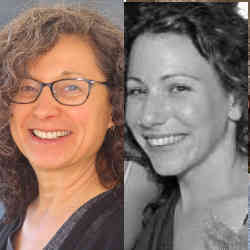
BLOG@CACM
Instructing Knowledge Science Analysis Strategies to Human Assets Practitioners – Half 4
Our final three blogs described a graduate-level course—Analysis Strategies for Human Assets—supplied by the Division of Labor Research at Tel Aviv College to human assets practitioners (managers and recruiters) from varied organizations in all three sectors of the Israeli economic system (public, non-public, and non-profit). One of many subjects taught on this course is information science analysis. As we emphasised in these blogs, the problem was to show information science ideas to college students who, on the one hand, have gaps of their pc science background and, however, are consultants in human assets administration and observe.
Particularly, in one in every of these blogs, we described how we dealt with college students’ expression of programming nervousness in a approach that didn’t contain programming. However, since we do imagine that programming expertise is essential for human assets practitioners within the information and tech period, we determined not to completely surrender the thought of imparting some programming expertise to our college students. We due to this fact designed 4 Colab notebooks that progressively introduce the scholars to the world of programming and allow them to expertise the style of the programming exercise.
Why ought to human assets practitioners achieve some programming expertise?
In a category dialogue we facilitated on the above query, college students advised the next 4 arguments, addressing 4 completely different ranges:
- Private stage: Lowering the nervousness of human assets practitioners, enhancing their self-efficacy as staff in a technology-oriented business, and selling their skilled growth;
- Skilled stage: Bettering the human assets practitioners’ understanding of the career of information science on the whole, and of the talents required for its efficiency particularly. Since all organizations have gotten data-driven organizations, such an understanding has a vital position in any group’s candidate recruitment processes, whatever the sector it belongs to;
- Organizational stage: Establishing the human assets practitioners of their group as staff who can contribute considerably to the discourse that takes place of their group, by introducing data-driven approaches to human assets administration (e.g., folks analytics) that finally will promote the group;
- Skilled neighborhood stage: Folks analytics (that’s, using information science for quite a lot of functions associated to human assets administration) is turning into a part of the career of human useful resource administration, for which some programming information is required. Subsequently, the programming expertise gained within the course may also help the human assets practitioners lead skilled processes of their skilled neighborhood.
The 4 notebooks
The 4 Colab notebooks we designed allow the scholars to expertise programming, on the whole, and Python programming, particularly. They’re:
The 4 notebooks have been facilitated over 4 consecutive weeks for about two hours every. As we will see, even such brief a programming expertise not solely lowered college students’ programming nervousness, but in addition elevated their self-evaluation of their programing expertise, in addition to their sense of potential contribution to their group in human resources-related subjects.
To handle the 4 ranges of the scholars’ professionalism described above (private, skilled, organizational, {and professional} neighborhood), we adopted a number of tips within the design of the notebooks.
On the one hand, we wished to scale back college students’ nervousness. Subsequently,
- the scholars may execute the Python instructions with out including any new code; but those that wished to counterpoint their expertise may add cells and write their very own code.
- the given code was illustrated with information about human assets (wage desk, bonuses, retention within the firm, and so forth.) and included visualization and calculation of statistical measures of those human resources-related ideas.
- we constantly illustrated how ChatGPT can assist the programming course of by permitting the scholars to ask any questions they wished about methods to program and receiving particular solutions with illustrative code.
Alternatively, we wished to offer the human assets practitioners a possibility to get a really feel for the pc science part of information science and expertise computational considering. The notebooks due to this fact:
- embody attention-grabbing, but easy, algorithms that will also be carried out manually (e.g., reworking a desk from a large format to a protracted format for the sake of visualization, see Pocket book 4);
- embody open duties for exploration. For instance, in Pocket book 3, as an example the position of information in algorithm execution, every pupil may add his or her private information to the demonstration of the implementation of the KNN algorithm. Then, when the algorithm predicted the categorization of a brand new worker, completely different categorizations have been typically obtained by completely different college students based on the info every one added.
How is the Python expertise expressed on the 4 ranges offered above, with respect to the publicity of the human assets practitioners to Python programming?
Because it seems, even such a brief programming expertise modified the scholars’ notion of their professionalism, as is illustrated beneath for the 4 ranges offered above.
Private stage: At first of the tutorial 12 months we requested the scholars what their programming expertise was; we requested them once more after their Python expertise. As might be seen in Desk 1, not solely did the proportion of responding college students who perceived themselves as having no programming expertise drop from 88.7% to 61.5%, however the share of responding college students who declared that they’ve some programming expertise greater than tripled from 9.4% to 30.8%.
Desk 1. College students’ notion of their programming expertise – firstly of the tutorial 12 months and after the programming expertise
| Starting of the tutorial 12 months (n=53) | After the programming expertise (n=26) | |
| I’m inexperienced |
88.7% |
61.5% |
| I’ve a bit expertise |
9.4% |
30.8% |
| I’ve a whole lot of expertise |
0% |
3.8% |
| If wanted, I can train programming |
1.9% |
3.8% |
In one other questionnaire, which was distributed previous to the programming expertise, we posed the next questions, amongst others:
In response to one of many questions in Questionnaire 1, a pupil wrote: “I felt anxious after I heard that we should be taught Python.” In your opinion, what quantity of the category feels that approach?
- Solely a handful of scholars
- Various them, however lower than half
- Various them, greater than half
- Virtually everybody
- Everybody
This query appeared additionally within the questionnaire that we distributed after the programming expertise. Desk 2 compares college students’ solutions to this query earlier than and after the programming expertise.
Desk 2. College students’ notion of the extent of programing nervousness – in the midst of the primary semester
(earlier than the programming expertise) and after the programming expertise
| Earlier than the programming expertise (n=53) | After the programming expertise (n=26) | |
| Solely a handful of scholars |
3.8% |
19.2% |
| Various them, however lower than half |
7.5% |
26.9% |
| Various them, greater than half |
39.6% |
38.5% |
| Virtually everybody |
34% |
15.4% |
| Everybody |
15.1% |
0% |
The info offered in Desk 2 reveals that earlier than the Python expertise, 88.7% of the scholars estimated that greater than half of the scholars felt programing nervousness; after the Python expertise, this quantity dropped to 53.9%. Much more attention-grabbing is the drop within the % of scholars who estimated that everybody feels nervousness: After the Python expertise, not one of the college students estimated that everybody has this sense, in contrast with 15.1% previous to the programing expertise. As might be seen, nervousness ranges subsided considerably.
Skilled stage: After every pocket book, we requested the scholars to counsel questions that they, as human assets practitioners, can ask candidates in a job interview and what they will be taught from the candidates’ solutions to those questions.
Desk 3 presents illustrative examples of questions that the scholars proposed in a shared doc after the primary and the final (fourth) notebooks. Clearly, such questions couldn’t have been requested with out having some programming expertise.
Desk 3. College students’ strategies of inquiries to be requested in interviews with candidates for his or her group
After engaged on Pocket book 1:
|
After engaged on Pocket book 4:
|
Organizational stage: Within the questionnaire distributed following the Python programming expertise, we requested the scholars: To what diploma will you be capable of contribute to the discourse at your group that focuses on software program growth, on the whole, and on Python, particularly, with relation to a) human assets; b) software program growth; and c) different organizational points? Desk 4 presents the distribution of pupil responses to the query, for every of the three subjects.
Desk 4. College students’ estimation of their contribution to the discourse of their group a couple of) human assets; b) software program growth; and c) different organizational points (n=26)
| Human assets points | Software program growth points | Different organizational points (one pupil didn’t reply) | |
| I’ll contribute considerably |
11 |
2 |
7 |
| I’ll have some contribution |
9 |
7 |
12 |
| I will be unable to contribute to the discourse |
6 |
17 |
6 |
As might be seen, the scholars see their biggest potential contribution to the discourse about software program growth within the context of human assets – precisely as was our goal in offering them with the Python programming expertise. Moreover, the human assets practitioners additionally realized that they might have some contribution to discourse associated to software program growth relating to different organizational points and software program growth points, but in a much less important approach.
Skilled-community stage: Folks analytics, for which some programming information is required, is turning into a part of the career of human useful resource administration. Because it seems, after the programming expertise, the scholars see this connection, encapsulated in folks analytics, between human assets and programming expertise, as is illustrated in what follows.
Within the questionnaire distributed following the Python programming expertise, we requested the scholars: In your opinion, to what diploma is figuring out programming, on the whole, and Python, particularly, related for human assets administration? As It seems, 19.2% of the scholars estimated this information as “very related,” 53.8% of the scholars estimated it as “considerably related,” and 26.9% of the scholars estimated it as “in no way related.” In different phrases, about three-quarters of the scholars realized the relevance of their brief, but centered, programing expertise for his or her career—human assets administration.
Conclusion
We advise that our selections to combine fundamental programming practices into the course, regardless of the Python nervousness college students expressed, and to not bypass this problem by introducing information science by way of one of many visible working environments (e.g., Orange Knowledge Mining, KNIME, and Weka), have been appropriate from the pedagogical perspective. As we anticipated, even the brief hands-on programming expertise turned out to be extraordinarily vital for the human assets practitioners on the non-public, skilled, organizational, {and professional} neighborhood ranges.
We conclude by mentioning that the interdisciplinarity of information science performed a central position in our potential to attain the above outcomes: The scholars’ experience in human assets enabled us to situate the Python expertise (the pc science part of information science) in a significant and acquainted context for the scholars – human assets (the appliance area part of information science), whereas coding and calculating fundamental statistics measures (the maths and statistics part of information science), which the scholars realized within the first a part of the course.
Orit Hazzan is a professor on the Technion’s Division of Training in Science and Know-how. Her analysis focuses on pc science, software program engineering, and information science training. For extra particulars, see https://orithazzan.internet.technion.ac.il/. Dafna Gelbgiser is a lecturer (tenure monitor) on the Division of Labor Research at Tel Aviv College’s College of Social Sciences. Her analysis examines the sources and patterns of inequality in training and labor market outcomes by race, immigrant standing, gender, and social class background. For extra particulars, see https://english.tau.ac.il/profile/dgelbgiser.
No entries discovered






